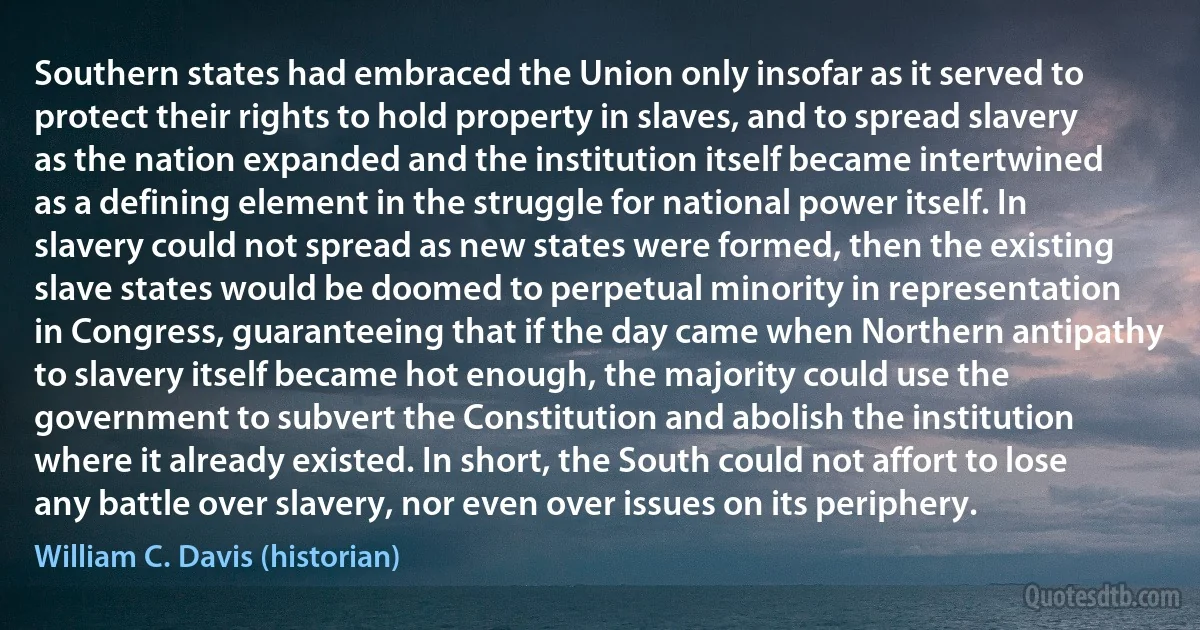
Southern states had embraced the Union only insofar as it served to protect their rights to hold property in slaves, and to spread slavery as the nation expanded and the institution itself became intertwined as a defining element in the struggle for national power itself. In slavery could not spread as new states were formed, then the existing slave states would be doomed to perpetual minority in representation in Congress, guaranteeing that if the day came when Northern antipathy to slavery itself became hot enough, the majority could use the government to subvert the Constitution and abolish the institution where it already existed. In short, the South could not affort to lose any battle over slavery, nor even over issues on its periphery.
William C. Davis (historian)Related topics
antipathy battle came congress day defining element enough government hot hold institution lose nation national nor northern periphery power property representation short slave spread subvert use statesRelated quotes
My argument against the dissolution of the American Union is this. It would place the slave system more exclusively under the control of the slave-holding states, and withdraw it from the power in the northern states which is opposed to slavery. Slavery is essentially barbarous in its character. It, above all things else, dreads the presence of an advanced civilization. It flourishes best where it meets no reproving frowns, and hears no condemning voices. While in the Union it will meet with both. Its hope of life, in the last resort, is to get out of the Union. I am, therefore, for drawing the bond of the Union more completely under the power of the free states. What they most dread, that I most desire.

Frederick Douglass
I do not believe that our friends at the South have any just idea of the state of feeling, hurrying at this moment to a pitch of intense exasperation, between those who respect their political obligations, and those who apparently have no impelling power but that which a fanatical position on the subject of domestic Slavery imparts. Without discussing the question of right - of abstract power to secede - I have never believed that actual disruption of the Union can occur without blood; and if, through the madness of Northern Abolitionists, that dire calamity must come, the fighting will not be along Mason's and Dixon's line merely. It [will] be within our own borders, in our own streets, between the two classes of citizens to whom I have referred.

Franklin Pierce
It is impossible to restore what is gone, obviously. I was born in the Soviet Union at about the same time as you (although we lived under different systems, we still listened to the same music, as we found out) but the world has changed since then, and the Soviet Union no longer exists. We have the Russian Federation, which is based on a Constitution adopted by our people. This Constitution proclaims the same set of values that is accepted by the absolute majority of humankind, notably, the supremacy of human rights, democracy, the protection of private property, market-based development and so on and so forth. I won't list all of them because these are universal values. So nobody wants to go back. There is no returning to the past.

Dmitry Medvedev
It took centuries of intellectual, philosophical development to achieve political freedom. It was a long struggle, stretching from Aristotle to John Locke to the Founding Fathers. The system they established was not based on unlimited majority rule, but on its opposite: on individual rights, which were not to be alienated by majority vote or minority plotting. The individual was not left at the mercy of his neighbors or his leaders: the Constitutional system of checks and balances was scientifically devised to protect him from both. This was the great American achievement-and if concern for the actual welfare of other nations were our present leaders' motive, this is what we should have been teaching the world.

Ayn Rand
To make a law final, so as not to be reached by Congress, is, by mere legislation, to fasten a new provision on the Constitution. Nay, more; it gives to the law a character which the very Constitution docs not possess. The wise fathers did not treat the country as a Chinese foot, never to grow after infancy; but, anticipating Progress, they declared expressly that their great Act is not final. According to the Constitution itself, there is not one of its existing provisions - not even that with regard to fugitives from labor - which may not at all times be reached by amendment, and thus be drawn into debate. This is rational and just. Sir, nothing from man's hands, nor law, nor constitution, can be final. Truth alone is final.

Charles Sumner
